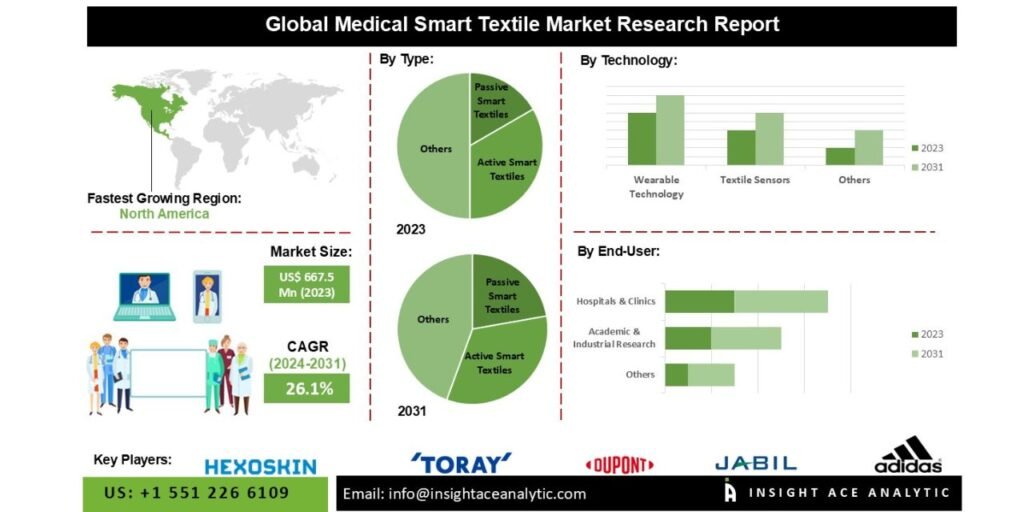
In the medical smart textile industry, sophisticated textiles are combined with microelectronics and sensor technologies to track and react to physiological changes in the human body. Textiles—also known as e-textiles—are designed to sense and react to various environmental cues, such as pressure, temperature, and wetness. They are used in many different healthcare applications, including treatment, drug-release systems, bio-monitoring, surgery, and cleanliness. Medical smart textiles can provide real-time health monitoring and therapeutic functions by integrating sensors and conductive elements into garments, which enhances patient care and management. The growing incidence of chronic illnesses, such as diabetes, respiratory conditions, and cardiovascular ailments, is the main driver of the medical intelligent textile market.
The expanding elderly population, which is more prone to certain illnesses, is driving up demand for medical smart fabrics. Moreover, advancements in diagnostic techniques and the integration of sensors and electrical components into textiles are driving the growth of this market. The rising need for advanced gadgets that provide real-time health monitoring and data collecting is also driving the market for medical smart textiles.
Nevertheless, the high production costs significantly impede the medicinal smart textile market. To develop and manufacture smart textiles, it is necessary to invest in sophisticated technologies and specialized machinery, which results in a significant capital expenditure. Furthermore, compatibility issues and their high cost restrict the widespread utilization of these textiles. Collectively, these elements present obstacles to the market’s expansion.
Competitive Landscape
Some of the Major Key Players in the Medical Smart Textile Market are
- Adidas International
- Jabil
- DuPont
- Toray Industries
- Hexoskin
- Pireta
- AiQ Smart Clothing
- Schoeller Textiles
- Vista Medical
- Sensoria
- Others
Market Segmentation:
The medical smart textile market is segmented on the basis of type and application. Based on type, the market is segmented as passive smart textiles, active smart textiles, and ultra-smart textiles. By application, the market is segmented into hospitals & clinics, and academic & industrial research.
Based on Type, the Active Smart Textiles Segment is Accounted as a Major Contributor in the Medical Smart Textile market
The active smart textiles segment is expected to hold a significant share of the global medical smart textile market in 2023 due to its extensive applications and sophisticated capabilities. Active smart textiles are highly effective for immediate health surveillance and therapeutic purposes and are sensitive and responsive to environmental stimuli. They are endowed with sensors and actuators. These textiles are extensively employed in applications such as bio-monitoring, drug delivery systems, and ubiquitous health devices, which are indispensable for enhancing patient care and administering chronic diseases. Active smart textiles are essential in contemporary healthcare settings because they can adapt to altering physiological conditions and provide immediate feedback.
Hospitals & Clinics Segment Witnessed Growth at a Rapid Rate.
The hospitals & clinics segment is anticipated to grow rapidly in the global medical smart textile market. This expansion is fueled by the growing prevalence of smart textiles in clinical settings for patient monitoring, diagnostics, and therapeutic applications. Hospitals and clinics employ these sophisticated textiles to optimize healthcare operations, enhance patient care, and improve treatment outcomes. The demand for medical smart textiles in these contexts is further fueled by the increasing prevalence of chronic diseases and the increasing necessity for continuous health monitoring
In the Region, the North America Medical Smart Textile Market Holds a Significant Revenue Share.
| Report Attribute | Specifications |
| Market Size Value In 2023 | USD 667.5 Mn |
| Revenue Forecast In 2031 | USD 4,077.0 Mn |
| Growth Rate CAGR | CAGR of 26.1% from 2024 to 2031 |
| Quantitative Units | Representation of revenue in US$ Mn and CAGR from 2024 to 2031 |
| Historic Year | 2019 to 2023 |
| Forecast Year | 2024-2031 |
| Report Coverage | The forecast of revenue, the position of the company, the competitive market structure, growth prospects, and trends |
| Segments Covered | By Type, By Technology, By Applications, By End User |
| Regional Scope | North America; Europe; Asia Pacific; Latin America; Middle East & Africa |
| Country Scope | U.S.; Canada; U.K.; Germany; China; India; Japan; Brazil; Mexico; France; Italy; Spain; South East Asia; South Korea |
| Competitive Landscape | Adidas International, Jabil, DuPont, Toray Industries, Hexoskin, Pireta, AiQ Smart Clothing, Schoeller Textiles, Vista Medical, Sensoria, and others |
| Customization Scope | Free customization report with the procurement of the report and modifications to the regional and segment scope. Particular Geographic competitive landscape. |
| Pricing And Available Payment Methods | Explore pricing alternatives that are customized to your particular study requirements. |
The North America medical smart textile market is expected to register the major market share in terms of revenue in the near future. High spending power and an increase in government expenditure in the military and defense sectors are the primary factors driving regional market growth. Furthermore, obesity is a significant health concern that affects a major portion of the population in the region. Therefore, consumers are increasingly inclined to adopt a lifestyle that is both healthful and active, which is reflected in their purchases of products that will facilitate their physical fitness. Due to rapid industrialization and urbanization, the increasing investments in ICT, the rapidly increasing population, and the increasing consciousness of health and fitness, the smart textiles market is expected to experience the most rapid growth in the Asia-Pacific region. The demand for smart wearables and apparel is subsequently increasing as a result of the burgeoning spending power.
Recent Developments:
- In April 2024, Crystal International Group Limited introduced its innovative “Smart-Fit” denim trousers. It collaborated with industry leaders, such as Advance Denim and LYCRA, to create a line of nine pairs of denim that seamlessly integrate body-enhancing features and comfort.
- In April 2024, Xiaomi unveiled its most recent smart home appliance, the Mijia Smart Invisible Clothes Dryer. It includes a built-in 36W light that can be adjusted for luminance and color temperature. It also offers a night light mode that emits a soft radiance and can be managed through the Mijia app.
- In March 2024, The Central Institute of Research on Cotton Technology (ICAR) in Mumbai conducted a three-day training session on “Smart Textiles and its Evaluation” as part of the Scheduled Caste Sub Plan initiative of the Indian Council of Agricultural Research. The purpose of this exercise was to enhance the skills and expertise of candidates from the scheduled caste community in the field of smart textiles.
Medical Smart Textile Market Report Scope

